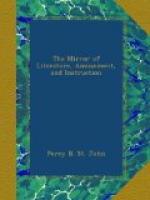B.—“Nothing impossible. It reminds me of a story somewhat as strange: During the battle of Delhi there was a quarter-master in the regiment, a queer fellow, who was never at a loss; (he is now in the corps, and can vouch for my statement) he was charging at the head of his squadron, when he caught a cannon shot in his hands: instantly dismounting, he chucked the ball into a field-piece, but, for want of a ramrod, he drove it home with his head. One of the enemy, seeing him thus zealously occupied, fired off the gun; strange to tell he was not killed! From constant exposure to the sun, in search of toddy, and from the free use of cocoa-nut oil, his head had become proof against shot. The distance from the place whence he was projected, to that where he was picked up, measured three miles, two furlongs, three yards, and eleven inches. A hard-headed fellow, Sir.—In his career he upset his colonel and a brace of captains.”
C.—“He did; and where the colonel was capsized, he made such a hole by his enormous weight, that the sovereign of Delhi ordered a large well to be dug on the spot, in memory of the event.”
B.—“I remember the well—twelve feet, three inches and a half, was the exact depth of the excavation occasioned by the fall.”
C.—“There you are wrong; only eleven feet, three inches—”
B.—“No, believe me, I am right; twelve feet, and three inches to a barleycorn.”
C.—“Never mind: a little, this way or that, is of no consequence. The most extraordinary thing was, that the gallant colonel only sprained his right arm.”
B.—“By no means extraordinary. You remember the great gun of Agra, in which a regiment of cavalry used to drill.”
C—“I do. The one that fired the stone ball to the wall of Futtipoore Sikrah—twenty miles.”
B.—“The same. Well, when that gun was fired, a thing that never occurred but once, the head of the rash man who fired it was afterwards found in the Old Woman’s Tank, eleven miles from the spot, without so much as a blemish, except a slight singing of the right whisker.”
C.—“Ah! I can never forget the time; I had just landed in Calcutta when we heard the report. Some of the wadding went as far as Cawnpore.”
Here the trumpet, sounding for morning drill, put a stop to the colloquy.—Englishman’s Magazine.
* * * * *
THE MISER’S GRAVE.
BY THE ETTRICK SHEPHERD.
Here’s a lesson for the earth-born
worm,
So deep engraven on the meagre platen
Of human frailty, so debased in hue,
That he who dares peruse it needs but
blush
For his own nature. The poor shrivell’d
wretch,
For whose lean carcass yawns this hideous
pit,
Had naught that he desired in earth or
heaven—
No God, no Saviour, but that sordid pelf,
O’er which he starved and gloated.




